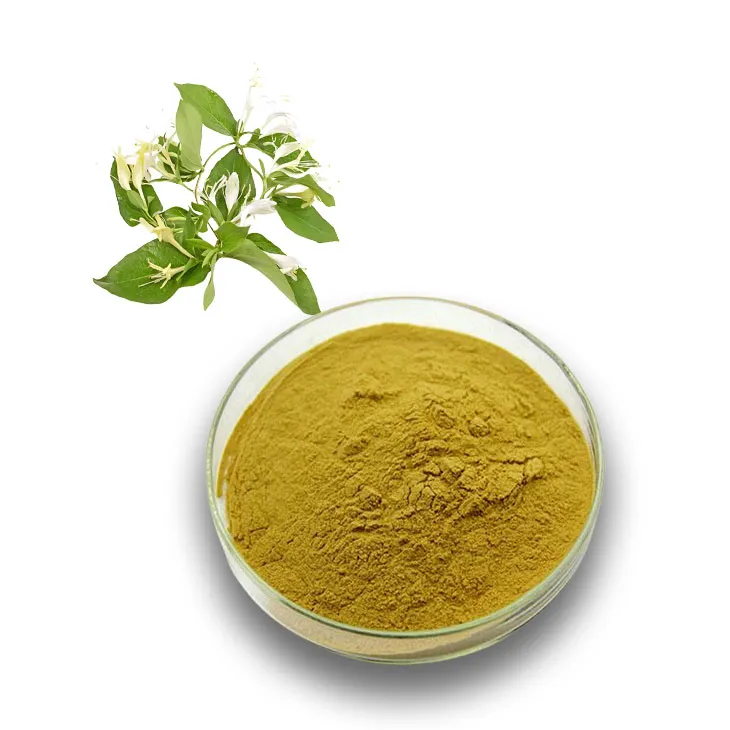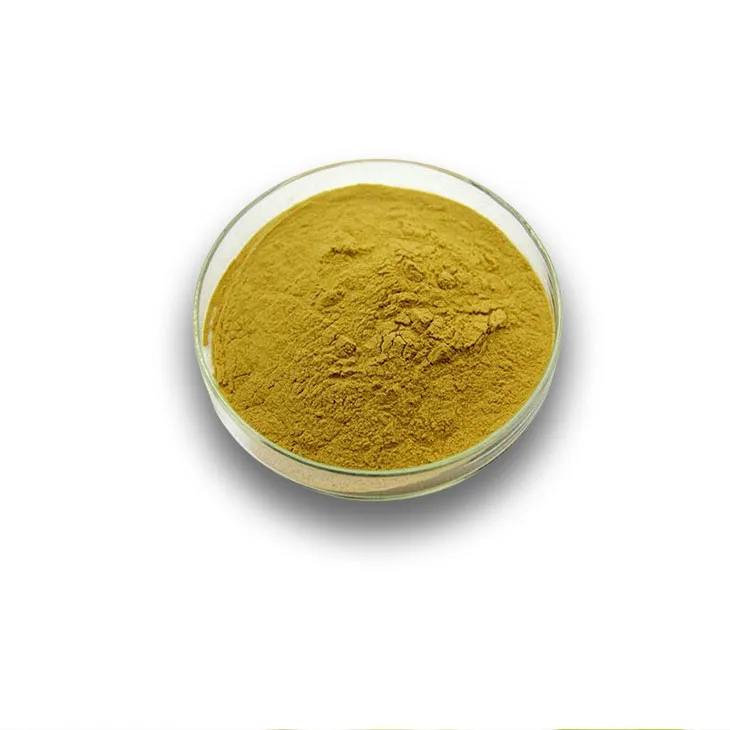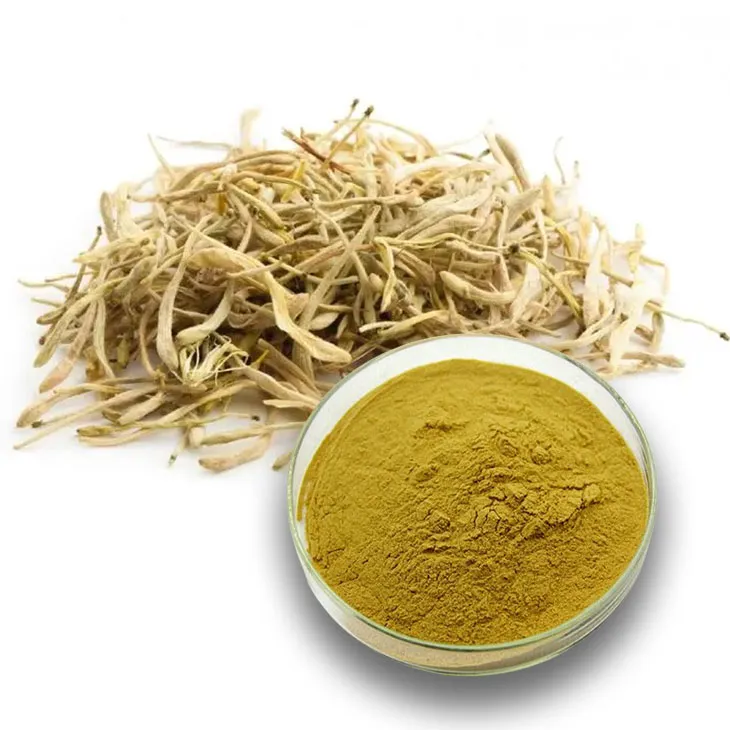- 0086-571-85302990
- sales@greenskybio.com
100% Pure Natural Honeysuckle Pollen.
2024-11-26

1. Introduction to Honeysuckle Pollen
Honeysuckle Pollen, being 100% natural, is truly a remarkable gift from nature. It is a tiny but powerful natural substance that has been gaining increasing attention in recent years. Honeysuckle itself is a well - known plant, and its pollen contains a wealth of valuable components.

2. Nutritional Composition
2.1 Proteins
One of the major components in Honeysuckle Pollen is proteins. Proteins are essential for various functions in the human body. They are the building blocks for tissues, muscles, and enzymes. In honeysuckle pollen, these proteins are in a form that can be easily absorbed by the body, providing a natural source of energy and helping in the repair and growth of cells.2.2 Vitamins
Honeysuckle pollen is also rich in vitamins. It contains vitamins such as vitamin C, vitamin E, and some B - vitamins. Vitamin C is well - known for its role in strengthening the immune system, promoting collagen synthesis, and acting as an antioxidant. Vitamin E is another powerful antioxidant that helps protect cells from damage. B - vitamins play crucial roles in metabolism, nerve function, and the production of red blood cells.2.3 Minerals
Minerals are also present in honeysuckle pollen. These include elements like calcium, magnesium, and iron. Calcium is important for bone health, muscle function, and nerve transmission. Magnesium is involved in over 300 biochemical reactions in the body, including energy production and muscle relaxation. Iron is essential for the formation of hemoglobin in red blood cells, which is responsible for carrying oxygen throughout the body.
3. Health Benefits
3.1 Antioxidant Properties
Honeysuckle pollen has significant antioxidant properties. Antioxidants are substances that can combat free radicals in the body. Free radicals are unstable molecules that are produced during normal metabolic processes, as well as due to environmental factors such as pollution and radiation. If left unchecked, free radicals can cause damage to cells, leading to various health problems, including aging, heart disease, and cancer. The antioxidants in honeysuckle pollen can neutralize these free radicals, thereby promoting overall well - being.3.2 Anti - inflammatory Effects
In the realm of traditional medicine, honeysuckle pollen has long been recognized for its potential anti - inflammatory effects. Inflammation is the body's natural response to injury or infection, but chronic inflammation can be harmful. The anti - inflammatory properties of honeysuckle pollen may help in reducing inflammation in the body, which could be beneficial for conditions such as arthritis, where joint inflammation is a major problem.3.3 Antibacterial Activity
Another important aspect of honeysuckle pollen is its antibacterial activity. Bacteria can cause a wide range of infections in the body, from minor skin infections to more serious internal infections. The antibacterial properties of honeysuckle pollen can help in inhibiting the growth of certain bacteria, providing an additional line of defense against infections. This has made it a subject of interest in the search for natural alternatives to antibiotics.
4. Collection and Purity Assurance
4.1 The Collection Process
The collection of honeysuckle pollen is a carefully managed process. It involves skilled workers who are trained to collect the pollen at the right time. This is crucial because the quality and quantity of pollen can vary depending on the time of collection. For example, the pollen is usually collected when the honeysuckle flowers are in full bloom. Specialized tools are used to gently collect the pollen without causing damage to the flowers or the surrounding environment.4.2 Purity Assurance
After collection, strict measures are taken to ensure the purity of the honeysuckle pollen. This includes cleaning processes to remove any impurities such as dust, debris, or other unwanted substances. Quality control checks are carried out at various stages of processing to ensure that the final product is 100% pure natural honeysuckle pollen. This makes it a top - choice for those who are seeking natural health supplements, as they can be confident that they are consuming a high - quality and pure product.
5. Incorporating Honeysuckle Pollen into a Healthy Lifestyle
5.1 Dietary Incorporation
There are several ways to incorporate honeysuckle pollen into your diet. One simple way is to add it to smoothies. You can blend a small amount of honeysuckle pollen with fruits, vegetables, and your choice of liquid (such as milk or yogurt) to create a nutritious and delicious smoothie. Another option is to sprinkle it on top of cereals or oatmeal in the morning. This adds a unique flavor and an extra boost of nutrition to your breakfast.5.2 Cosmetic Use
Honeysuckle pollen can also be used in cosmetics. Due to its antioxidant and anti - inflammatory properties, it can be an excellent ingredient in skincare products. It can be found in some natural face creams, masks, and lotions. These products can help in improving the skin's texture, reducing inflammation, and protecting the skin from environmental damage.5.3 Precautions
While honeysuckle pollen has many benefits, it is important to take some precautions. Some people may be allergic to pollen, so it is advisable to start with a small amount when using it for the first time. If any allergic reactions such as itching, swelling, or difficulty breathing occur, stop using it immediately and seek medical attention. Also, make sure to purchase honeysuckle pollen from a reliable source to ensure its quality and purity.6. Comparison with Other Natural Supplements
6.1 Nutritional Profile Comparison
When compared to other natural supplements, honeysuckle pollen has a unique nutritional profile. For example, compared to bee pollen, which is also a popular natural supplement, honeysuckle pollen may have different ratios of vitamins, minerals, and proteins. While bee pollen is rich in a variety of nutrients, honeysuckle pollen may offer specific benefits due to its own composition.6.2 Health Benefit Comparison
In terms of health benefits, honeysuckle pollen's antioxidant, anti - inflammatory, and antibacterial properties set it apart from some other supplements. Some supplements may focus mainly on one aspect, such as providing only antioxidant support. However, honeysuckle pollen offers a combination of these benefits, making it a more comprehensive natural supplement option.7. Future Prospects of Honeysuckle Pollen
7.1 Research and Development
There is still much research to be done on honeysuckle pollen. Scientists are interested in further exploring its potential health benefits and understanding its mechanisms of action at a molecular level. This could lead to the development of new products based on honeysuckle pollen, such as more targeted health supplements or even pharmaceuticals.7.2 Market Expansion
As more people become aware of the benefits of natural products, the market for honeysuckle pollen is likely to expand. There is a growing demand for natural health supplements that are both effective and safe. Honeysuckle pollen, with its numerous benefits and natural purity, has the potential to capture a larger share of this market in the future.8. Conclusion
In conclusion, 100% pure natural honeysuckle pollen is indeed a natural treasure. Its rich nutritional composition, including proteins, vitamins, and minerals, along with its various health benefits such as antioxidant, anti - inflammatory, and antibacterial properties, make it a valuable addition to a healthy lifestyle. The careful collection process and purity assurance also make it a reliable choice for those seeking natural health supplements. With further research and market expansion, the future of honeysuckle pollen looks promising.
FAQ:
What are the main nutrients in 100% pure natural honeysuckle pollen?
100% pure natural honeysuckle pollen is rich in proteins, vitamins, and minerals.
How does honeysuckle pollen contribute to health?
It has antioxidant properties that can fight free radicals in the body, promoting overall well - being. Also, it has long been used in traditional medicine for its potential anti - inflammatory and antibacterial effects.
Is the collection process of honeysuckle pollen reliable?
Yes, its collection process is carefully managed to ensure purity.
Who might be interested in using honeysuckle pollen?
Those seeking natural health supplements would be interested in using honeysuckle pollen.
Can honeysuckle pollen replace other health supplements?
While honeysuckle pollen is a great natural health supplement, it may not be able to fully replace other supplements. Each supplement has its own unique set of nutrients and benefits, and the best approach to supplementation depends on an individual's specific health needs.
Related literature
- The Nutritional and Medicinal Value of Honeysuckle Pollen"
- "Honeysuckle Pollen: A Comprehensive Study on Its Purity and Benefits"
- ▶ Hesperidin
- ▶ citrus bioflavonoids
- ▶ plant extract
- ▶ lycopene
- ▶ Diosmin
- ▶ Grape seed extract
- ▶ Sea buckthorn Juice Powder
- ▶ Beetroot powder
- ▶ Hops Extract
- ▶ Artichoke Extract
- ▶ Reishi mushroom extract
- ▶ Astaxanthin
- ▶ Green Tea Extract
- ▶ Curcumin Extract
- ▶ Horse Chestnut Extract
- ▶ Other Problems
- ▶ Boswellia Serrata Extract
- ▶ Resveratrol Extract
- ▶ Marigold Extract
- ▶ Grape Leaf Extract
- ▶ blog3
- ▶ Aminolevulinic acid
- ▶ Cranberry Extract
- ▶ Red Yeast Rice
- ▶ Red Wine Extract
-
Elderberry Extract
2024-11-26
-
Tamarind extract powder
2024-11-26
-
Dan Shen Root Extract/Salvia Root Extract
2024-11-26
-
Licorice Root Extract Powder
2024-11-26
-
Oyster Mushroom Extract Powder
2024-11-26
-
Dandelion Leaf Extract
2024-11-26
-
Saponin Extract
2024-11-26
-
Citrus Aurantii Extract
2024-11-26
-
Green Tea Extract
2024-11-26
-
Acerola Extract
2024-11-26





















